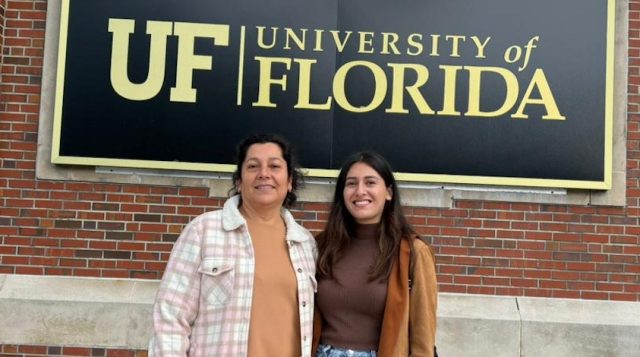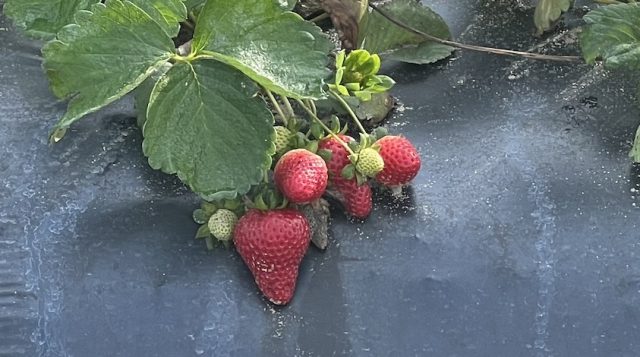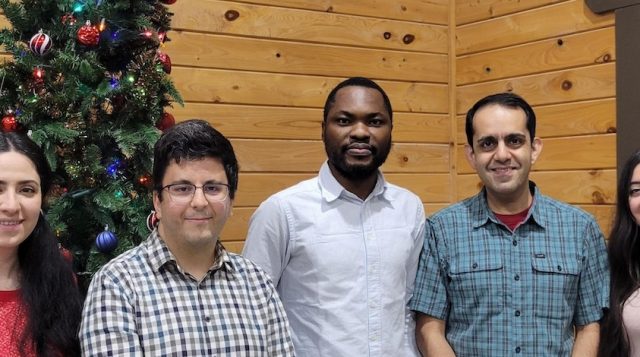The M.S. program offers tracks in Food Science and in Nutritional Sciences. The Institute of Food Technologists and the American Society for Nutrition recognize these concentrations. Specific areas of study include nutrition biochemistry/molecular biology, nutrition function/metabolism, medical nutrition therapy/dietetics, nutrition immunology, food processing/engineering, food chemistry/biochemistry, and food safety/microbiology/quality.
Applicants must have an adequate background in physical and biological sciences and food science or nutritional sciences. Students with specific deficiencies will be required to take prerequisite courses.
Learn more about the M.S. in Food Science and Human Nutrition on the UF Catalog Website, including information of requirements for the degree, lists of courses, and student learning outcomes.
Current Food Science and Human Nutrition graduate student?
Check Canvas for graduate forms, program plans, rubrics, seminars, the Nutritional Sciences graduate program handbook, checklists for graduation, and more.
Food Science Track
Food Science is the study of techniques and systems to ensure food is safe, available, wholesome, and delicious. Food scientists use chemistry, biochemistry, microbiology, nutrition, and engineering to understand and manage food composition, processing, and safety.
-
Quick Facts
Background
- The graduate programs of the department apply established scientific principles and methods to better understand factors that impact food science and nutrition.
- Faculty in the department write research proposals that get funded by an agency or organization to do a specific project. Graduate students are often hired to perform the work on the project while getting their degree at the same time.
- Graduate student expectations:
- Students can expect to become critical thinkers while submerging themselves into the literature of their research.
- Students write research proposals, as well as present their hypothesis and ideas for their dissertation.
- Students are expected to publish their findings in peer-reviewed journals
Emphasis Areas
- Food chemistry: Involves the understanding of analytical, biochemical, chemical, functional, physical, and toxicological aspects of food constituents.
- Food microbiology: Encompasses all microbiological aspect of food safety in food production, food spoilage, food preservation and storage; also includes areas of biosecurity, biotechnology, and microbial genomics.
- Food processing: Uses engineering principles, methods and techniques to transform raw agricultural commodities into consumable food products.
- Food technology: Involves the application of modern scientific and engineering principles to the preservation and distribution of food.
- Sensory evaluation: Applies the scientific method and statistical analysis to the assessment of all the qualities of a food item as perceived by the human senses.
Requirements
-
A minimum of 30 credits total must be satisfactorily completed for the thesis M.S. degree. This credit total consists of a minimum of 24 course credits and 6 research credits. At least one course in each of three program areas below must be completed to ensure a broad background in food science. Examples of courses are listed after each of the major program areas.
- Food Processing and Engineering: FOS 4427C, Principles of Food Processing; FOS 6428C, Advanced Food Processing
- Food Microbiology and Safety: FOS 4222, Food Microbiology and FOS 4222L, Food Micro Laboratory; FOS 5225C, Principles of Food Microbiology; FOS 6226C, Advanced Food Microbiology
- Food Chemistry: FOS 4311C, Food Chemistry; FOS 6315C, Advanced Food Chemistry
- Among the 24 required course credits, the following must be completed:
- Food Science and Technology Seminar (FOS 6938, 1 credit)
- Research Planning (FOS 6915, 2 credits)
- Statistical Methods in Research I (STA 6166, 3 credits)
-
Current Research Projects in the Food Science Track
Learn more about our exciting faculty research on our Faculty Research page.
Learn more about specific courses offered through the FSHN Department on the Schedule of Courses website.
- Step 1: Choose the semester from the first dropdown menu.
- Step 2: Select 'Campus/Web/Special Program' from the next menu.
- Step 3: Choose 'Graduate' in the next menu.
- Step 4: Click on 'Food Science and Human Nutrition' in the last menu.
-
Information for Current M.S. Food Science Track Graduate Students
See Canvas for graduate forms, program plans, rubrics, seminars, the Food Science graduate program handbook and more. The handbook contains information on critical dates and deadlines, course selection, complete list of course requirements, degree requirements, grade requirements, presentation of research, changing majors, graduate assistantships, and much more.
-
Financial Information for Graduate Students
Learn more here.
- HOW TO APPLY
-
Contact Us
Dr. Renée Goodrich-Schneider, Graduate Coordinator
Nutritional Sciences Track
Nutritional Sciences is the study of how food impacts human health, including nutrition-related chronic disease, malnutrition, metabolism, dietary patterns, and food insecurity. Nutritional scientists use chemistry, biology, nutrition, and the social sciences to understand and influence how diet shapes the health of individuals and populations.
Nutritional Sciences graduate students are exposed to a rich academic and research environment. In addition to the Department’s array of nutrition graduate courses, students are expected to broaden their program by selecting from courses in biochemistry, chemistry, medical sciences, animal science, epidemiology, gerontology, physiology, veterinary medicine, bioinformatics, anthropology, microbiology, and statistics.
-
Quick Facts
Background
- The graduate programs of the department apply established scientific principles and methods to better understand factors that impact food science and nutrition.
- Faculty in the department write research proposals that get funded by an agency or organization to do a specific project. Graduate students are often hired to perform the work on the project while getting their degree at the same time.
- Graduate student expectations:
- Students can expect to become critical thinkers while submerging themselves into the literature of their research.
- Students write research proposals, as well as present their hypothesis and ideas for their dissertation.
- Students are expected to publish their findings in peer-reviewed journals
Emphasis Areas
- Emphasis areas include basic nutritional sciences, biochemistry and molecular biology, genetics, immunology, physiology, animal nutrition, human nutrition, and biostatistics.
- Research areas of emphasis include:
- Human nutrition: encompasses clinical nutrition and dietetics, supplement studies, and metabolic trials; these research projects often involve use of our campus’s fully-equipped UF Clinical Research Center.
- Molecular and cellular nutrition and metabolomics: comprises nutrient transport, basic metabolism, nutrient-gene interactions, genetics, and genomics
Requirements
- A minimum of 30 credits total must be satisfactorily completed for the thesis M.S. degree. This credit total consists of a minimum of 24 course credits and 6 research credits. Completion of this coursework ensures that students will have a broad background in basic nutritional sciences. Students may select departmental coursework from the following partial list of offerings:
- HUN 5441: Metabolic Response to Enteral and Parenteral Nutrition
- HUN 5447: Nutrition and Immunity
- HUN 6245: Advanced Human Nutrition
- HUN 6255: Clinical Nutrition
- HUN 6301: Nutrition Aspects of Lipid Metabolism
- HUN 6305: Nutritional Aspects of Carbohydrates
- HUN 6321: Proteins and Amino Acids in Nutrition
- HUN 6331: Vitamins in Human Nutrition
- HUN 6356: Minerals in Nutrition
- HUN 6812: Analytical Techniques in Nutrition Biochemistry
- Among the minimum 24 required credits, the following must be completed:
- HUN 6938: Nutritional Sciences Seminar and Colloquium
- FOS 6915: Research Planning or approved substitute
- STA 6166: Statistical Methods in Research I
- BCH 6206: Advanced Metabolism
-
Current Research Projects in Nutritional Sciences
Learn more about our exciting faculty research on our Faculty Research page.
Learn more about specific courses offered through the FSHN Department on the Schedule of Courses website.
- Step 1: Choose the semester from the first dropdown menu.
- Step 2: Select ‘Campus/Web/Special Program’ from the next menu.
- Step 3: Choose ‘Graduate’ in the next menu.
- Step 4: Click on ‘Food Science and Human Nutrition’ in the last menu.
-
Information for Current Nutritional Sciences Graduate Students
See Canvas for graduate forms, program plans, rubrics, seminars, the Nutritional Sciences graduate program handbook, and more. The handbook contains information on critical dates and deadlines, course selection, complete list of course requirements, degree requirements, grade requirements, presentation of research, changing majors, graduate assistantships, and much more.
-
Financial Information for Graduate Students
Learn more here.
- HOW TO APPLY
-
Contact Us
Dr. Renée Goodrich-Schneider, Graduate Coordinator



